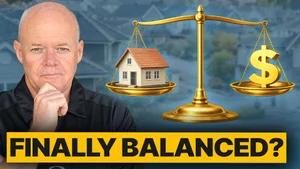Is the housing bubble about to burst? Are we even in a housing bubble? I guess it depends on who you ask because there are so many different opinions out there. It's honestly hard to keep track. I have to admit, I have a hard time keeping track myself. What I do know is that prices have been going up ridiculously fast. Homes are receiving multiple offers, there are bidding wars, and the final sales prices are often way over list price. It's just crazy!
One thing that everyone does seem to agree on is this can’t continue. This can’t be the new norm. The insanity has to end, and I agree with that, but does that automatically mean we are in a bubble and heading for a crash? Watch the following video, or continue reading below, to see what 4 leading industry experts have to say.
Are We Even in a Housing Bubble?
Traditionally, by definition, bubble markets occur when prices are being driven by speculation, not fundamentals. Whatever we want to call it, the bottom line is there are a lot of people that want to buy a home and are having trouble doing so because of current market conditions here in Frisco and Prosper. They're getting priced out and are left confused and not sure what to do. Let’s face it, a lot of the news and information out there is scary. Headlines say “don't buy now”, “don't do this”, “don't do that”, “home prices are over-inflated”, “this is going to happen”, “that's going to happen”, etc. The problem with these scare tactics, and that’s exactly what they are, is they're flat out guessing because nobody can say for certainty what's going to happen a year from now. I mean, look at COVID. Did anyone see that coming? At the height of the lockdowns, there were all kinds of videos and reports out there saying the housing market is doomed and it's going to crash. It didn’t. In fact, housing ended 2020 having one of its strongest years in terms of total homes sold.
It’s important to keep in mind that what we are experiencing currently in the housing market isn’t impacting just housing. Have you noticed how few new cars there are on dealers’ lots? Have you seen what used car prices have done? Have you been watching what's been going on with the prices of consumer durables? Know anyone that’s ordered furniture or appliances lately? Delivery can be months out. How about building supplies - windows, lumber, brick. Pool chemicals are also in short supply? The list goes on so it’s not just the housing market that’s gone crazy.
What 4 Leading Experts Believe
Back in May, I wrote a similar blog post that shared what four major financial institutions were saying about a housing bubble. The analysts at J.P. Morgan, Goldman Sachs, Morgan Stanley, and Merrill Lynch all stated the fundamentals of housing were strong and the price increases were not due to a bubble, but the large imbalance between supply and demand.
Four leading industry professionals and organizations have weighed in, after looking at the latest data and shared what they believe we’re seeing in the housing market currently.
The Joint Center for Housing Studies at Harvard University recently released The State of the Nation's Housing 2021 report:
“… conditions today are quite different than in the early 2000s, particularly in terms of credit availability. The current climb in house prices instead reflects strong demand amid tight supply, helped along by record-low interest rates.”
That echoes what we've been talking about this for a while now, it's not a crisis, but a supply problem. High demand has been further fueled by record-low interest rates.
Nathaniel Karp, Chief U.S. Economist at BBVA:
“The housing market is in line with fundamentals as interest rates are attractive and incomes are high due to fiscal stimulus, making debt servicing relatively affordable and allowing buyers to qualify for larger mortgages. Underwriting standards are still strong, so there is little risk of a bubble developing.”
One of the items discussed in the previous blog post was bubbles tend to occur when there's a great deal of speculation in the market. When the fundamentals aren't being adhered to. I went through the market in the 2000s and can tell you it was different than what we are experiencing today. For a mortgage, you literally had to fog a mirror, sign a document, get the loan. The fact that you didn't deserve, or prove, you had the ability to repay a million-dollar mortgage didn't matter. In many cases, you didn't have to provide assets, you didn't have to provide proof of income. There was no verification. It was highly speculative, and what happened, a frenzy was created, everything was artificial. Today, the end-user of the vast majority of homes being bought is the owner-occupant, not long-term investors, not people trying to flip the home quickly for a profit.
One of the shifts we’ve seen as a result of COVID and increased remote work possibilities is a migrational shift with people moving from higher-priced coastal areas to more affordable states like Texas, Tennessee, Idaho, Alabama, and Florida. People moving from high-value areas to traditionally more affordable areas are putting additional pressure and extra demand on an already tight supply, pushing prices in those markets up beyond historical norms
Bill McBride of Calculated Risk states:
“It's not clear at all to me that things are going to slow down significantly in the near future. In 2005, I had a strong sense that the market would turn and that when it turned, things would get very ugly. Today, I don't have that sense at all, because all of the fundamentals are there. Demand will be high for a while because Millennials need houses. Prices will keep rising for a while, because inventory is so low.”
I recently read a report in the Wall Street Journal talking about housing inventory. In real estate, a balanced market (one that favors neither buyers nor sellers) is achieved when you have a six-month supply of homes. What does that mean? That basically means at the current pace of sales it would take six months to sell everything currently for sale. The current supply in both Frisco and Prosper is less than 1 month! In the article, the Wall Street Journal estimates that nationally we need about 8 million homes to come on the market to achieve balance, 8 million! That's a lot of property! The truth is we've been massively underbuilt for years.
Mark Fleming, Chief Economist at First American recently said:
“Looking back at the bubble years, house prices exceeded house-buying power in 2006 nationally, but today, house-buying power is nearly twice as high as the median sales price nationally…..
Many find it hard to believe, but housing is actually undervalued in most markets and the gap between house-buying power and sales prices indicates there's room for further house price growth in the months to come.”
Goldman Sachs, J.P. Morgan, Morgan Stanley, and Merrill Lynch, along with these respected industry experts are all saying the exact same thing. I realize that doesn’t help anyone that has been forced to the sidelines and is unable to buy because of rising prices and intense competition, but, unless something unforeseen happens to the economy overall, it does not appear that homes will be more affordable a year from now.
Do I believe we will start to see more balance in the markets? I do. We're already seeing signs of a little bit of a shift, but that shift doesn't mean a bubble's going to burst and that shift doesn't mean a crash is imminent. We are starting to see a little bit more supply come on the market as more sellers decide to take advantage of market conditions and sell. Likewise, new home builders are building as fast as they can. They've been struggling to build more homes due to supply constraints. They haven't been able to get the raw materials or labor. Now that COVID restrictions are being lifted across the entire country, factories are getting back to full production, and the supply chain is being refilled. It's taking that mechanism a while to crank back up and catch up with the shortages we are experiencing across a number of industries. As that happens we will see stabilization occur in the overall economy, including housing.
In cases where sellers are shooting for the moon, in terms of list price, your going to see those prices come down, but don't confuse that with an underlying trend, assume air is coming out of a perceived bubble, or think the market is about to crash. There are no signs of that whatsoever.
Bottom Line
While I do believe we will see more inventory and the housing market start to stabilize, I don’t believe those that are waiting for prices to fall will be happy with that decision a year from now. Waiting until the market settles and the bidding wars diminish is one thing, but hoping for the market to devalue is another.
I share this information to help you can make the best decision for you, as that's what's most important. The right time to buy, or sell, is when it's the right time for you to buy or sell based upon your unique circumstances. if you have any questions or a situation you'd like to talk through in more detail, please feel free to Schedule a Call. I'm always happy to share my insights with you.







